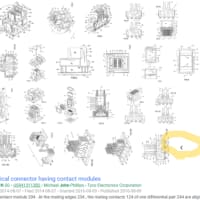本を手に階段を上って息子の部屋に入って寝る前の読み聞かせをしようとする父に対し、息子は言った:"Daddy, what did you bring that book that I don't want to be read to out of up for?" (Steven Pinkerの"The Language Instinct, How the Mind Creates Language")
人が文を作る時、複雑な入れ子構造のようなものを人間の頭が、子供でさえ、いかにアクロバティックに処理するかの例。
特許英訳する時、先行詞を関係代名詞や分詞で修飾する場合に、両者間にどの程度の距離が許されるのか、時々悩む。
"There is a context to U.S. President Barack Obama's planned visit to Hiroshima that is unspoken" (The Japan Times On Sunday, May 15, 2016, page 12)
形だけ見れば、thatの先行詞はcontext, visit, Hiroshimaのいずれか。意味から判断して、contextに係ると判断する。と言うか、There is a contextと読んだ、聞いた時点でa contextに関する説明への無意識的な期待が生じ、visitやHiroshimaまで聞いてもまだ肝心の「a context」が宙に浮いていて説明を要求しており、that is...で初めて説明が得られて解決に至る。だからthatの係りに誤解は生じないのだと思う。
とは言え、特許翻訳ではThere is a context. The context is unspoken.で済ませば良いかも知れない。
距離が短い例
"Goda's team looked at brain cells growing in culture and in slices of the hippocanpus, the seahorse-shaped structure in the brain that is heavily involved in memory-formation." (The Japan Times Sunday, May 15, 2016, p. 21)
(主題である"structure"という語句の重要性、存在感、説明への要求力が"brain"に対するそれを遥かに凌駕している、的な?)
追記2022/04/13
Is language a thought? Can we think without language?
8:50 "a lot of thinking goes on in forms other than language"
9:06 "Do they have the same shape, or a different shape?"(単数形"a different shape";日本人としては"different shapes"が正しいと思える)
9:40 Long-term memory remembers the "gist"
10:34 Tacit knowledge is necessary to understand language, but it itself is not language.
13:40 Capacious mental lexicon
18:36 Long-distance dependencies. "Sentences can be rendered difficult to understand if they have too many long-distance depencendies, because that can put a strain on the short-term memory of the reader or listener while trying to understand them."
22:57 Ambiguous sentences: "Discuss sex with Dr. Ruth"
24:02 Language acquisition: Hard-wired with universal grammar
2023年5月24日追記:
上記引用部のグーグル翻訳:
「パパ、私に読まれたくない本を何のために持ってきたの?」
Gさんまだまだ。



























※コメント投稿者のブログIDはブログ作成者のみに通知されます